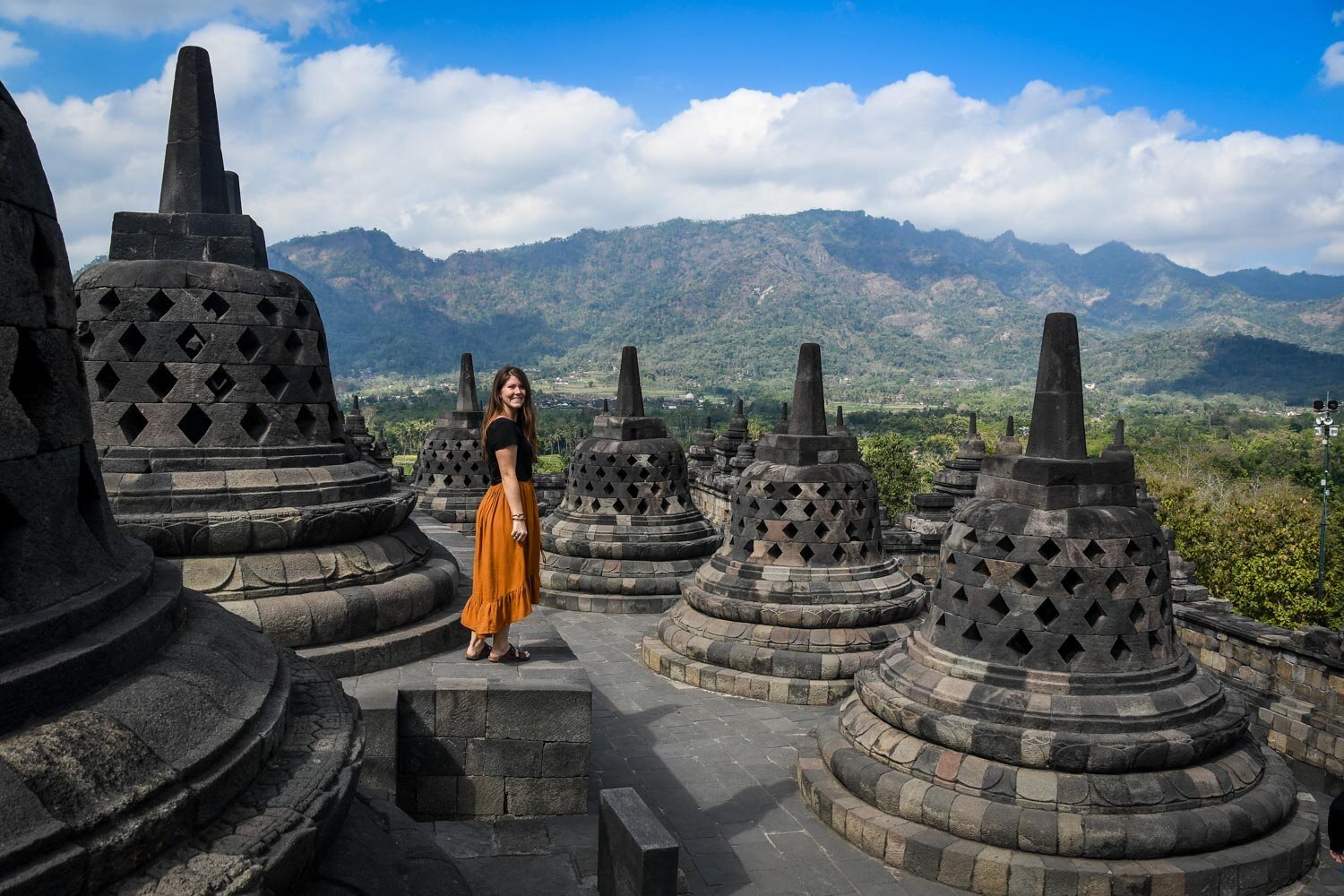Imagine standing atop an ancient marvel, as the first rays of dawn paint the sky in hues of orange and gold, slowly illuminating hundreds of stupas and the lush, emerald tapestry of Central Java below. This is Borobudur, a UNESCO World Heritage site and the world’s largest Buddhist temple, a place where history, spirituality, and breathtaking natural beauty converge. But Borobudur is more than just an architectural wonder; it’s a living landscape, rich with culture and vibrant local life, especially evident in its Borobudur temple local produce. Venture beyond the awe-inspiring carvings, and you’ll discover a culinary and craft journey that offers a true taste of Indonesia.
Highlights: A Tapestry of Culture and Nature
The atmosphere surrounding Borobudur is nothing short of magical. The air, especially in the early morning, is cool and fresh, often carrying the scent of dew-kissed earth and distant cooking fires. As you ascend the temple, the sheer scale of the structure, built with millions of volcanic and river stones, is humbling. Each relief carving tells a story, a silent narrative of Buddhist cosmology and ancient Javanese life, offering a profound sense of connection to a civilization long past.
Beyond the temple complex, the natural scenery is equally captivating. Borobudur is nestled in a fertile valley, flanked by the majestic peaks of Mount Merapi and Mount Merbabu. Picture endless stretches of vibrant green rice paddies, meticulously terraced and shimmering in the sunlight, interspersed with traditional Javanese villages where life unfolds at a gentle, unhurried pace. The rhythmic sounds of roosters crowing, the distant call to prayer, and the friendly greetings of locals create an authentic, immersive experience that transports you far from the hustle and bustle of modern life. It’s a place where cultural highlights aren’t just confined to monuments but are woven into the very fabric of daily existence.
Activities: Engaging with the Heart of Java

While the temple itself is the undeniable star, the real magic of Borobudur lies in engaging with its surrounding communities and their way of life. This is where the Borobudur temple local produce truly shines, offering unique local experiences:
- Taste the Volcanic Bounty: The fertile volcanic soil around Borobudur is a gift, yielding an abundance of delicious produce. You simply must try the local salak pondoh, also known as snake fruit. Unlike other varieties, this one is particularly sweet, crisp, and juicy – a delightful tropical treat. Many local stalls sell them, often freshly picked. Don’t forget to sample the rich, aromatic local coffee, often grown on small plantations nearby. The traditional kopi luwak (civet coffee) is also produced here, offering a truly unique, albeit controversial, coffee experience.
- Village Cycling Tours: Rent a bicycle and pedal through the serene rice paddies and sleepy villages. This is the perfect way to observe local farming techniques, see how gula aren (palm sugar) is made, or witness the intricate process of crafting traditional pottery. Many tours include stops at local homes where you can interact with residents and perhaps even learn a few words of Bahasa Indonesia.
- Culinary Delights: Participate in a cooking class to learn how to prepare authentic Javanese dishes using fresh, local ingredients. Imagine creating gudeg (young jackfruit stew) or tempeh mendoan (fried fermented soybean cake) with your own hands, guided by a local expert. It’s an unforgettable way to connect with the local culture through its flavors.
- Artisan Encounters: Visit workshops where local artisans create intricate batik fabrics, wooden carvings, or traditional musical instruments. You can observe their craftsmanship and even try your hand at some basic techniques. These aren’t just souvenirs; they are pieces of Borobudur’s soul.
Travel Tips: Making Your Journey Seamless
Ready to plan your unforgettable trip? Here’s what you need to know:
- Best Time to Visit: The dry season, from April to October, is ideal for clear skies and stunning sunrises. Weekdays are generally less crowded than weekends. For the iconic sunrise view, arrive well before dawn.
- How to Get There: Borobudur is located approximately 40 kilometers northwest of Yogyakarta. The easiest way to get there is by private car with a driver (around 1 hour), or by public bus from Jombor Terminal in Yogyakarta (longer journey, requires a transfer). Ride-hailing apps like Grab and Gojek also operate in the area.
- Entrance Fees: Prices vary for local and international visitors, and also depend on whether you purchase a regular day ticket or a special sunrise/sunset ticket (which often includes access before/after regular hours and sometimes breakfast). Expect to pay around IDR 400,000-500,000 for foreign adults for a regular ticket, and significantly more for sunrise access directly from the temple complex. Always check the latest prices on the official Borobudur website before your visit.
- Nearby Attractions: Don’t miss the smaller but equally significant Mendut and Pawon temples, often visited in conjunction with Borobudur as part of a single complex. For an alternative, equally stunning sunrise view (especially if direct temple sunrise tickets are sold out or too pricey), head to Punthuk Setumbu hill.
- Local Food Specialties & Souvenirs: Beyond the Borobudur temple local produce like salak and coffee, be sure to try nasi pecel (rice with peanut sauce and vegetables) and wedang ronde (ginger drink with glutinous rice balls). For souvenirs, look for beautiful batik textiles, intricate wooden carvings, traditional pottery, and of course, local coffee beans and salak chips to bring a piece of Borobudur home with you.
Conclusion: More Than Just a Landmark
Borobudur is more than just an ancient monument; it’s an immersive journey into the heart of Javanese culture and a testament to human ingenuity. While the colossal temple will undoubtedly leave you breathless, it’s the exploration of its fertile surroundings, the warmth of its people, and the authentic flavors of its Borobudur temple local produce that will truly enrich your travel experience. So, are you ready to explore beyond the stones and savor the soul of this incredible destination? Come, let Borobudur awaken all your senses!


